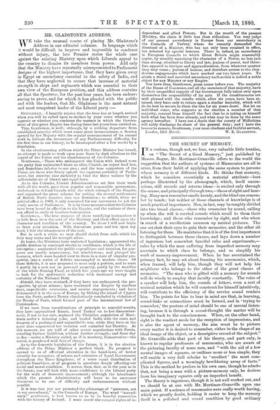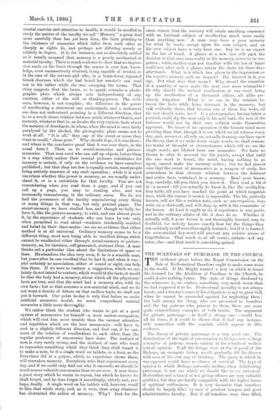THE SECRET OF MEMORY.
Ia curious, though not, we fear, very valuable little treatise, 1 on " The Secret of a Good Memory," just published by Messrs. Bogue, Mr. Mortimer-Granville offers to the world the suggestion that the authors of systems of Mnemonics are all in error, from their habit of applying the same system to persons whose memory is of different kinds. He thinks that memory, which he considers essentially a material attribute—best perhaps illustrated by the phonograph, which, itself uncon- scious, still records and returns ideas—is excited only through the senses, and principally through two,—those of sight and hear- ing. Many men remember smells keenly, and the blind can remem- ber by touch; but neither of those channels of knowledge is of much practical importance. Men, in fact, may be roughly divided into two broad classes,—those who remember by sound, calling up when the will is exerted sounds which recall to them their knowledge ; and those who remember by sight, and who when in search of a recollection summon up mental pictures. The one set shut their eyes to gain their memories, and the other sit listening for them. He maintains that it is of the first importance to distinguish between these classes, and lays down a number of ingenious but somewhat fanciful rules and experiments,— rules by which the man suffering from imperfect memory may ascertain to which class he belongs, and so simplify his work of memory-improvement. When he has ascertained the primary fact, he may set about framing his mnemonics, which, when framed, will help him, though they will not help his neighbour who belongs to the other of the great classes of memories. "The man who is gifted with a _memory for sounds will do wisely to employ that faculty constantly. The voice of a speaker will help him, the sounds of letters, even a sort of musical notation which he will construct for himself intuitively, will contribute to the efficiency of the service sound renders him. The points for him to bear in mind are that, in learning, sound-links or connections must be formed, and in trying to remember,' the posture of mind should be one of mental listen- ing, because it is through a sound-thought the matter will be brought back to the consciousness. When, on the other hand, sight is the readiest mode for the reception of impressions, and is also the agent of memory, the aim must be to picture every matter it is desired to remember, either in the shape of an ideal image of the object, or a descriptive record of the subject." Mr. Granville adds that part of his theory, and part only, is known to regular professors of mnemonics, who are aware of the picturing faculty of some men, and "with the aid of a few mental images of squares, or outlines more or less simple, they will enable a very dull scholar to ' recollect ' the most com- plicated figures, and a seemingly bewildering array of facts." This is the method he prefers in his own case, though he admits that, not being a man with a picture-memory only, he derives from his imaginary squares only an imperfect benefit. The theory is ingenious, though it is not well worked out, and we should be at one with Mr. Mortimer-Granville upon one main point. If a science of mnemonics were really worth having, which we greatly doubt, holding it easier to keep the memory itself in a polished and sound condition by good ordinary
mental exercise and attention to health, it would be needful to study the nature of the faculty we call "Memory " a great deal more carefully than has yet been done, the facts pointing to the existence of memories which differ from each other as sharply as sights do, and perhaps not differing merely or entirely in degree. It is, for instance, not so absolutely settled as is usually assumed that memory is a purely mechanical or material faculty. There is much evidence to show that no impres- sion made on the brain through the senses is ever lost, know- ledge, even unconsciously received, being capable of revival, as in the case of the servant-girl who, in a brain-fever, repeated Greek choruses which she had heard her master's sou read out to his father while she was sweeping the rooms. That story suggests that the brain, so to speak, contains a photo- graphic plate which always acts independently of any exertion, either of the will or thinking-power. The evid- ence, however, is not complete ; the difference in the power of recollecting a statement one understands, and a statement one does not understand pointing in a different direction, that is, to a much closer relation between mind, whatever that is, and memory, whatever that is; as do also the very curious facts about the memory of drunkards, in whom, when the mind is once fairly paralysed by the alcohol, the photograhic plate seems not to work at all. " It is all," they say of the event or scene they want to recall," clean gone." Why should it go, if it was there ; and where is the conclusive proof that it was ever there, in the usual form ? Then, as to sound-memories and picture- memories. That men exist who can call up objects before them in a way which makes their mental pictures substitutes for memory is certain, if only on the evidence we have ourselves published; but that they are few is equally certain, most people being entirely unaware of any such operation ; while it is most uncertain whether this power is memory, as we usually under- stand it, or is a substitute for that faculty. You are not remembering when you read from a page, and if you can call up a page, you may be reading also, and not necessarily remembering, in the ordinary sense. We do not find the possessors of the faculty remembering every thing or many things in that way, but only printed pages. The sound-memory we have studied less, and though we fully be- lieve it, like the picture-memory, to exist, and can almost prove it, by the experienCe of students who can learn by rote only when permitted to read aloud—students intolerably snubbed and hated by their class-mates—we see no evidence that either method is at all universal. Ordinary memory seems to be a different thing, most men being able to recollect things which cannot be recollected either through sound-memory or picture- memory, as, for instance, self-generated, abstract ideas. A man thinks out a particular idea about the limitations of space or
time. He abandons the idea very soon, if he is a sensible man, but years after he can recollect that he had it, and what it was ;
and certainly no association, either of sound or sight, can help him there. If we were to venture a suggestion, which we cer- tainly do not intend to venture, which would fit the facts, it would be that the body had a memory, about which all the physicists' facts are true, and that the mind had a memory also, with its own facts; but as that assumes a non-material mind, and we do not want a douche of letters on that endless topic, we shall not put it forward. Our point to-day is only that before we make artificial memories useful, we must comprehend natural memories a little more thoroughly.
We rather think the student who wants to get at a good system of mnemonics for himself—a most useless occupation, which will cost him more trouble than the earnest attention and repetition which are the best mnemonics—will have to seek in a slightly different direction, and find out, if he can, more of the relation of recollections to each other, than the regular professors of mnemonics have done. The instinct of men is very rarely wrong, and the instinct of men who want to remember something which they think they shall forget is to make a note, be it a single word on tablets, or a knot, as the Peruvians did in a quipus, which, as experience shows them, will reawaken memory. Everybody tries that experiment every day, and if we could only find out why it succeeds, we should be much nearer valuable mnemonics than we are now. A man hears a good story which be wants to repeat, but which he knows he shall forget, and he does forget it accordingly, utterly and, per- haps, finally. A single word on his tablets will, however, recall to him that whole story, and, as it were, clear away whatever has obstructed the action of memory. Why ? Just for the same reason that the memory will retain anything connected with an habitual subject of recollection much more easily than anything new. A man may have a poor memory for what he reads, except upon his own subject, and on his own subject have a very keen one. Say he is an expert in the law of fraud. A glance at a new case will pack the decision in that case immovably in his memory, never to be for- gotten ; while another man not familiar with the law of fraud could not, after such a glance, retain the facts for three days afterwards. What is it which has given to the impression on the expert's memory such an impact P His interest in it, you say. But what does that mean ? Why should the retention of a quantity of cases make the next case more retainable Or why should the revived recollection of one word bring up the recollection of a thousand others, all alike pre-
viously forgotten. What is or can be the relation be- tween the facts while lying dormant in the memory, but still evidently there, that because one of them has woke, all the rest should wake, too ? If a photographer, having taken a portrait, could dip the nose only iu his acid bath, the rest of the features would not by their own volition make themselves apparent. We know of no operation of the human mind more puzzling than that, though it is one which we all witness every day, and, moreover, all rely on, actually framing our lives upon the theory that if we write down single words, we shall remem- ber trains of thought or circumstances which, till we see the single words, are blotted from our memories. We have no theory to offer to account for the puzzle, except that until the one word is found, the mind, having nothing to go upon, cannot make the memory active ; but we feel almost sure that the secret of mnemonics, as a weapon of study, lies somewhere in that obscure relation between the dormant and active facts contained in a memory. Read your lesson, boy, carefully, till you think you know it. Then read a bit of it—a morsel—till you actually do know it, like the multiplica- tion table, till you have reached the point at which forgetful- ness, while the reason is sound, is impossible. The bit, perfectly known, will act like a written note, such as unscrupulous boys write on a shirt-cuff, and will drag up with it the remainder of the lesson. At least it ought to do, if experience is any guide, and in the ordinary affairs of life it does do so. Whether it actually will, if your lesson is not thoroughly learned, may be doubtful, for nobody knows exactly how far the things they can suddenly recall were thoroughly learned; but if it is learned, the over-studied key-word will prevent any sudden access of forgetfulness. That much is, at all events, certain—ask any actor, else—and that much is something gained.



































 Previous page
Previous page